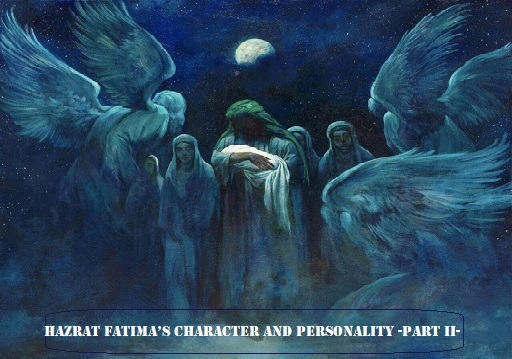RADHIA (One who is satisfied) and MARDHIA (The one who satisfies)
She was always satisfied with whatever Allah wished for her. Once she asked her father if he could give her a maid to help her in her housework.
The Prophet (S.A.W.W) replied, “Fatima, I will give you something that is better than a servant. After every prayer say ‘Allahu Akbar’ 34 times Alhamdulillah 33 times and subhanallah 33 time surely this is better for you than what you wanted…”
She replied, “I am pleased with Allah and his Messenger.” She started reading what her father had taught her for as long as she lived and it came to be known (and is still known) as Tasbih-E-Fatiam.
Allah, too, was satisfied with her and honoured her specially in many ways. Allah made her Muhaddisa, Zahra and Batul.
MUHADDISA (One who speak with Angels)
Sheikh Sudduq, a famous Shia scholar, writes that Imam Jaffer Sadiq said, “Fatima was called”MUHADDISA’ because Angels came to her from heaven and addressed her, as they had addressed Mariam Bint Imran, saying cOh Fatima! Allah has chosen you (to be) above the women of all nations’.” In short, she was called MUHADDISA because she talked with Angels.
ZAHRA (The Lady of Light)
Allama Majlisi quotes Ibne Abbas who heard the Prophet (S.A.W. W) say: “Surely my daughter is the leader of all women from the beginning to the end. She is pan of me and the light of my eyes. She is the flower of my head and is my soul.
She is a human Houri. Whenever she stands in prayers in the presence of her Lord (Allah) light comes from her and makes the sky bright. The earth shines to the Angels like star shines to the people of earth."
Somebody asked Imam Sadiq (A.S) as to why Hazrat Fatima (S.A) was called Zahra. The Imam replied, ’“Because when she stood up in prayers in the Mehrab, her light would shine to the in habitants of heaven as the lights of planets shine to the people of the earth.”
BATUL (The Virgin One)
So as to give you exact meaning of this quality we shall give here sevejkl reports from various scholars of Islam:
Sheikh Suleiman Kundusi, the famous Sunni Qazi of Constamnopel says, “She (Fatima) was safe from menstruation and bleeding at the time of giving birth to a child”.
Al-Kashfi Al Hanafi says in his book Manaqib: “Fatima (S.A) was called Al-Batul because she was sale from that which women experience every month (menstruation).”
The author of Tarikh Al Kabir writes on the authority of Um Salma who says, “Fatima has never menstruated nor discharged childbed blood.”
The famous Sunni scholar, Suyuti, says, “Among Fatima’s extraordinary qualities is that she did not menstruate and when she gave birth to a child she would immediately become purified so as not to miss her prayers.”
The famous Sunni historian, Tabari, says that Asma Bint Umays said, “When Fatima (S.A) gave birth to Hasan she did not bleed; indeed, she does not experi ence menstrual bleeding at all.
When I informed the Prophet (S.A.W.W) about this he said, ‘Do you not know if t my daughter is pure and chaste? She does not discharge blood from childbirth or menstruation’“.
Source:
A Brief Biography of Hazrat Fatima (A.S.), [Pg. 25-27].
By: M.M. Dungersi Ph.D.

